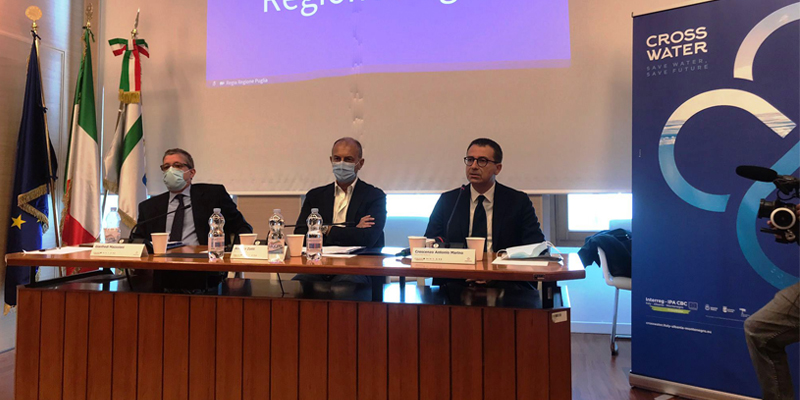
Today the launch press conference in Presidency building of Puglia Region
Bari / June 17th, 2021 - "Cross Water is an important thematic project that deals with a strategic element such as water and which, thanks to funding of over 5.5 million euros, constitutes an important opportunity for Puglia and for the whole partnership (Albania, Montenegro and Molise) of which it is the lead one ". Andrea Zotti (project manager for Puglia Region - Budget Department, General Affairs and Infrastructure, Water Resources Section) told it at the launch press conference, today in the “Di Jeso” hall of the Presidency Building of in Bari. “At the end of this project, we aim to have an efficient and effective water management system. An objective we are already working towards through the joint development of new infrastructures and technologies, as well as new control and measurement systems” Zotti said.
A conference which brought institutional greetings by Crescenzo Antonio Marino (Puglia Region - Managing Authority of the Interreg IPA CBC Italy-Albania-Montenegro Program) who underlined how the issue of water is also crucial in the new programming: "Puglia has succeeded in recent years to be the protagonist of good practices held for example also by the OECD (Organization for Economic Co-operation and Development). The Cross Water project is now part of this wake, which will bring benefits both from the point of view of raising awareness about fighting against water waste and the technologies used to monitor its quality".
Gianfredi Mazzolani (project manager for Apulian Aqueduct - Project Coordination and Technical Development Structure / COSSV) spoke about the Apulian pilot initiative led by AQP: "Thanks to Cross Water project we will be able to acquire tools for the continuous monitoring of water quality at Monopoli and Sammichele di Bari treatment plants. In this way we will optimize the waste water and sludge treatment processes and identify the best performing monitoring and information system. In general, we will reduce energy consumption (we will perform the same processes using a lower amount of energy) and the environmental impact in terms of CO2 released into the atmosphere, of the amount of sludge to be disposed and of de-phosphating reagents".
